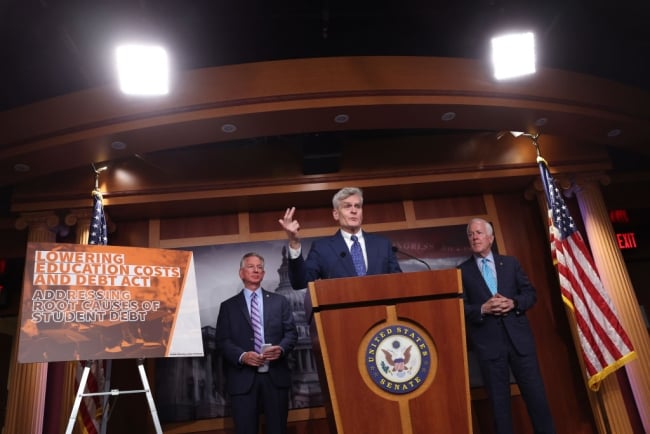You have /5 articles left.
Sign up for a free account or log in.

Louisiana senator Dr. Bill Cassidy, a Republican, is a co-sponsor of the package of bills that aim to lower the cost of college. The proposal is Cassidy’s first major legislative proposal since becoming the top Republican on the Senate education committee.
Kevin Dietsch/Getty Images
If the Biden administration’s plan to forgive up to $20,000 in federal student loans fails at the Supreme Court, Senate Republicans say they have an answer for what policy makers should do next to address the student debt crisis.
Louisiana senator Dr. Bill Cassidy unveiled a package of bills Wednesday that he and other Senate Republicans said would rein in the cost of a college education and address the root causes that are driving students to take on more loans. The Lowering Education Costs and Debt Act, which is a collection of five bills, gives a good look into Cassidy’s priorities as ranking Republican on the Senate education committee.
“Student loan debt is an anchor on people’s feet, and that is what is keeping them from mobility,” Cassidy said at a press conference. “We’re trying to make it so that this person has a future untethered by student loan debt, which predictably they would not be able to pay back.”
Cassidy, who sponsored a resolution that would’ve blocked Biden’s debt-relief plan, criticized that plan as a Band-Aid that “saddles taxpayers with a burden again in five years.”
Cassidy and other Republican co-sponsors including Texas senator John Cornyn, Alabama senator Tommy Tuberville and Iowa senator Chuck Grassley largely pointed to colleges and universities as a key cause of the student debt crisis.
“The last 35 years have shown that a government blank check to the universities has made problems worse,” Tuberville said.
Cassidy’s act is unlikely to move forward with Democrats in control of the Senate, though he said during the press conference that the bill’s provisions are not partisan and provide just information to students. Also on, Wednesday Vermont senator Bernie Sanders, who chairs the Senate education committee, introduced the latest version of the College for All Act, which would double the maximum Pell Grant award, guarantee tuition-free community college for all students and allow eligible students to attend four-year institutions without taking on debt.
The Lowering Education Costs and Debt Act, on the other hand, would prevent colleges and universities from accessing federal financial aid for their students if program graduates don’t clear certain earnings thresholds. It would streamline repayment options, require some loan counseling, improve transparency about college programs to give students and families better information, standardize student aid offers, and limit graduate school borrowing, among other provisions. Over all, the different provisions, Cassidy said, would put “downward pressure” on colleges and universities to reduce costs.
The package includes Cassidy’s College Transparency Act, which has been introduced for several years and is backed by several higher education groups and some Democrats, as well as a new bill from Grassley that would require all colleges and universities to use the same form to prepare student aid offers. The Government Accountability Office criticized colleges’ aid offer letters in a report last year.
“If students are going to make wise choices about the cost of education, and what sort of help they get to go to college, they ought to be comparing apples with apples, not apples with oranges,” Grassley said at the press conference.
Higher education groups say institutions need to do better rather than move to one required form.
A ‘Pragmatic’ Proposal
Beth Akers, a senior fellow at the right-leaning think tank the American Enterprise Institute, said Cassidy’s proposal shows that Republicans are “stepping up to plate” on higher education policy.
“I think this really establishes the Republicans as being willing to participate in meaningful talks on this issue when the time comes if Democrats come back to the table,” she said.
Akers added that Democrats in Congress are focused on debt cancellation as a key policy, but they might come back to the table to discuss more incremental changes if the Supreme Court strikes down the Biden administration’s debt-relief plan.
The act’s provisions related to loan repayment would prevent the Biden administration from moving forward with its proposed income-driven repayment plan and restrict the Education Department’s ability to create new repayment plans.
Sponsored by Cornyn, the Streamlining Accountability and Value in Education (SAVE) for Students Act would discharge loans for low-income undergraduate borrowers with lower balances after 10 years and automatically enroll delinquent borrowers into the plan.
“I’m actually surprised at how generous this seems relative to what I might have expected from coming from the party,” Akers said. “I think it shows a real commitment to wanting to find a compromise with Democrats that makes education accessible but also not excessively risky.”
That bill also would restrict access to federal financial aid for undergraduate programs in which half of the graduates don’t earn more than the median high school graduate. The Biden administration is proposing a similar threshold for career education programs subject to gainful-employment requirements.
Akers said the proposed accountability measures were surprising but could be consequential.
“Both gainful and this piece are indicative of an evolution that we’ve seen in higher ed for ensuring return on investment and acknowledging that that’s an important piece that we need to be concerned about when taxpayer dollars are on the line,” she said.
Over all, Akers said the package of bills would do good things for students and taxpayers.
“Institutions are not going to like it,” she said.
Jon Fansmith, senior vice president for government relations at the American Council on Education, said the package is “moderate, reasonable and pragmatic.”
“It’s a pretty well-balanced package of bills, and I think it shows a lot of thought and consideration,” he said, adding that ACE doesn’t support all the bill’s provisions. “This is certainly a good starting place for something that at least would have a much more reasonable chance than some of the other things we’ve seen proposed.”
Senate Republicans have been without a clear leader on higher education policy since Tennessee senator Lamar Alexander retired, but this proposal shows Cassidy’s interest in filling that void.
“This is a very positive indicator of how he wants to cooperate on the committee, how he wants to lead the minority vote on that committee and the policies that they’re intending to tackle,” Fansmith said. “It’s a great opening gesture from the senator—something I think we’re very encouraged by.”
Rachel Rotunda, director of government relations for the National Association of Student Financial Aid Administrators, said the proposal is notable in that it comes from a ranking member on the education committee and could inform future efforts to address affordability and accountability.
Rotunda said transparency and disclosures are big themes of the proposal, which echo recent proposals from the Biden administration.
“The focus that’s been placed on this issue by the Biden administration, as well as both Republicans and Democrats in Congress, is that student loans and the repayment system, really, as a whole are in need of some reforms,” she said.








